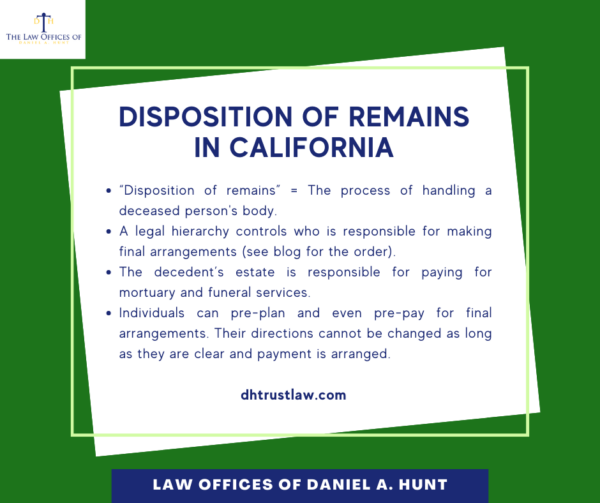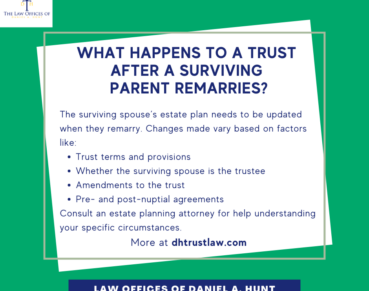Disposition of Remains in California

Losing a loved one is one of life’s most difficult experiences, and amidst the grieving process, there are numerous practical matters that need attention. One crucial aspect is the disposition of remains – the process of handling a deceased person’s body. In the state of California, specific laws govern how these matters are handled, ensuring dignity, respect, and adherence to the wishes of the deceased and their family. In this guide, we’ll delve into the intricacies of the disposition of remains in California.
Legal Framework
California has a well-established legal framework that governs the disposition of remains. The primary statutes relevant to this process are found in the California Health and Safety Code, particularly sections 7100-7117. These laws outline the rights and responsibilities of individuals regarding the disposition of their own remains, as well as those of their deceased relatives.
Decision-Making Authority
One of the key aspects of the disposition of remains in California is determining who has the authority to make decisions regarding the deceased’s final arrangements. The law provides a hierarchy of individuals who hold this authority. The order goes as follows:
- An agent under a power of attorney for health care (or “Advance Healthcare Directive”) who has the right and duty of disposition.
- The competent surviving spouse.
- The sole surviving competent adult child of the decedent, or if there is more than one competent adult child of the decedent, the majority of the surviving competent adult children. If there is not a majority but a reasonable effort has been made to notify all surviving competent adult children of the instructions and you are not aware of any opposition, then a minority of adult children can act as agents.
- The surviving competent parent or parents of the decedent. If one of the surviving competent parents is absent, the remaining competent parent must make a reasonable effort to locate the absent parent before acting as the agent.
- The sole surviving competent adult sibling of the decedent, or if there is more than one surviving competent adult sibling of the decedent, the majority of the surviving competent adult siblings. If there is not a majority but a reasonable effort has been made to notify all surviving competent adult siblings of the instructions and there is no known opposition, then a minority of siblings can act as agents
- The surviving competent adult person or persons respectively in the next degrees of kinship, or if there is more than one surviving competent adult person of the same degree of kinship, the majority of those persons. Less than a majority can also serve under the same rule that applies to adult children and adult siblings.
- If none of the above categories of kin are available, then a funeral director or cemetery authority can act as an agent for the disposition of remains.
Note that a person cannot act as an agent for the disposition of remains if they have been charged with first or second-degree murder or voluntary manslaughter.
Who Pays For The Disposition of Remains?
Family members may wonder who is responsible for paying the costs associated with the disposition of remains. California law states that the decedent’s estate is liable for the reasonable costs associated with mortuary and funeral services.
Methods of Disposition
California law recognizes several methods of disposition, including burial, cremation, and donation to science. Each method has its own set of requirements and considerations.
- Burial involves interring the body in a cemetery.
- Cremation entails the reduction of the body to ashes through intense heat.
- Donation to science involves donating the body to medical institutions for research and education purposes.
It’s essential to understand the implications of each option and make an informed decision based on personal, religious, and cultural beliefs.
Religious and Cultural Considerations
California is a diverse state with people from various religious and cultural backgrounds, each with their own customs and traditions regarding death and burial. The law recognizes the importance of accommodating these diverse beliefs while also ensuring public health and safety. Individuals and families should be aware of how their religious and cultural practices align with California’s legal requirements for the disposition of remains.
Preplanning
Advance planning for the disposition of remains is becoming increasingly common. Californians have the option to prearrange their final arrangements, specifying their preferences and relieving their loved ones of the burden of making decisions during a time of grief.
Preplanning can involve purchasing burial plots, selecting funeral services, and even prepaying for expenses. However, it’s crucial to ensure that any prearrangements comply with California law and are properly documented to avoid complications later on.
According to the California Health and Safety Code section 7100, “A decedent, prior to death, may direct, in writing, the disposition of his or her remains and specify funeral goods and
services to be provided.” The law states that these directions may not be changed, unless required by law, as long as the directions are unambiguous and arrangements for payment have been made.
What If the Agent Fails to Act?
What happens if the agent fails to take action and make decisions regarding the disposition of remains?
If the agent fails to act or delegate authority to another person within seven (7) days from the date of the decedent’s death, then their rights shall be relinquished and passed on to the person who is next closest in kinship to the decedent.
For example, if the adult children failed to make any decisions regarding the disposition of their deceased parent’s remains for over a week, then the decedent’s living competent parents may step in to serve in this role.
An exception to this general rule is granted to surviving spouses, who have a slightly longer period of ten (10) days to act before the control is relinquished to the person of the next degree of kinship.
What To Do Next
After waiting 7 or 10 days for the original agent to act, the person with the next degree of kinship can file a petition with the California Probate Court, asking the court to release the decedent’s remains to their control.
If there are two individuals with equal rights to control the disposition of remains (such as two adult children of an unmarried parent who died without appointing a health care agent), then the funeral establishment or cemetery authority that’s in possession of the remains can file a petition seeking a court order directing the proper disposition of these remains.
When dealing with the immediate aftermath of a loved one’s passing, an experienced trust and estate attorney can help ensure a smooth and dignified process.
If you have any questions about the disposition of remains in California, feel free to contact our office.
Law Offices of Daniel A. Hunt
The Law Offices of Daniel A. Hunt is a California law firm specializing in Estate Planning; Trust Administration & Litigation; Probate; and Conservatorships. We've helped over 10,000 clients find peace of mind. We serve clients throughout the greater Sacramento region and the state of California.




